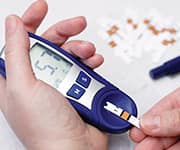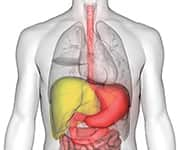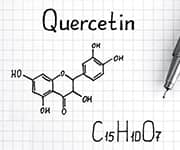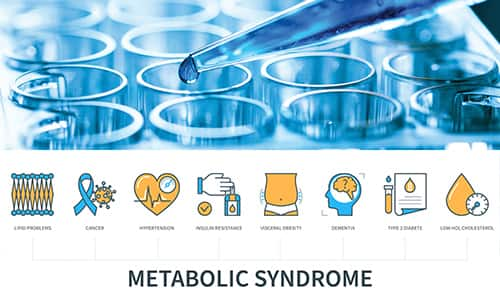Life Extension Magazine®
Metabolic disorders can result in rapid onset of chronic illnesses.
Dietary factors, sedentary lifestyle, and poor gut health are contributors to poor metabolic health.1-3
Scientists have learned that quercetin, found in plant foods, can counter metabolic dysfunction.4
A clinical study in older adults with metabolic syndrome found that quercetin reduced cardiovascular risk factors.5
What is Metabolic Syndrome?
Metabolic syndrome is a cluster of conditions that includes any three of the following: 6
- Elevated blood pressure
- High blood sugar
- Large waist circumference
- Low HDL cholesterol
- High triglycerides
Individuals with metabolic syndrome are at increased risk of diabetes and its complications, cardiovascular disease, age-related disorders, and death.6,7
Quercetin to the Rescue
Scientists have long been intrigued about why unprocessed, plant-based diets are protective against metabolic disease.
One nutrient, the flavonoid quercetin, is particularly prevalent in a wide range of fruits, vegetables, and medicinal plants. Hundreds of studies—in cell culture, animals, and humans—have documented the multiple properties of this nutrient.
Many of its effects in the body apply directly to metabolic health, reversing many of the changes present when metabolic health is not ideal.4
In a controlled clinical trial in older adults with metabolic syndrome, quercetin was shown to improve metabolic health, reduce cardiovascular risk factors, and decrease participants’ metabolic age.5
Better Blood Glucose Control
Metabolic disease is usually thought to be caused by insulin resistance and insufficient blood glucose control.
The hormone insulin helps cells to take up and process nutrients from the diet, including sugars. In most metabolic diseases, cells fail to respond to insulin appropriately; this is called insulin resistance.8,9
The result of insulin resistance is high blood levels of glucose that contribute to chronic degenerative diseases that accompany aging. That is why individuals with diabetes or the metabolic syndrome have higher rates of most chronic diseases.2
After-meal glucose spikes are damaging for all individuals, and likely more so for diabetics. These blood sugar surges are contributors to cellular and vascular damage and raise the risk of cardiovascular disease and premature death.
Quercetin has been shown to improve glucose control as shown on the following page:
- Preclinical studies show quercetin helps activate cellular pathways—such as AMPK—that improve metabolism and reverse insulin resistance.4,10,11
- A meta-analysis of randomized controlled trials revealed that quercetin supplementation for eight weeks or more, at a dosage of 500 mg or higher, reduced fasting blood glucose. That same dose also reduced excess insulin concentrations.12
- Remarkably, even one single dose of quercetin has been demonstrated to exert a beneficial clinical effect in a study in type II diabetics. In a randomized, placebo-controlled trial, 24 diabetics already being treated with medication were given 400 mg of quercetin before receiving a simple sugar. After the sugar dose, blood glucose was suppressed in those who received quercetin, compared to the placebo arm.13
- Another clinical trial found that long-term quercetin supplementation resulted in a significantly improved response (lower blood sugar spike) to an oral glucose tolerance test.5
Quercetin supplementation clearly resulted in improved glucose control and a healthier carbohydrate metabolism.
What you need to know
Improve Metabolism with Quercetin
- Metabolic disorders are increasingly common, and scientists warn of a growing epidemic.
- Metabolic abnormalities include obesity, diabetes, the metabolic syndrome, abnormal blood lipid levels, and non-alcoholic fatty liver disease.
- All these related disorders dramatically increase the risk for age-related chronic diseases, from cancer to dementia.
- Scientists have found that quercetin—a flavonoid found in many plants—is protective of metabolic health.
- Clinical and preclinical studies show that supplementation with quercetin can benefit many aspects of metabolic disease, improving blood glucose control and lipid levels while protecting the liver and reducing inflammation and oxidative stress.
Improved Lipid Levels
Another prominent feature of metabolic disease is elevated levels of LDL cholesterol and triglycerides and reduced HDL cholesterol (the “good cholesterol”).2 Like elevated blood glucose, these changes are contributors to cardiovascular disease.1,2
Multiple human studies have shown the benefits of quercetin for lipid abnormalities.
In overweight and obese adults with early metabolic syndrome, 150 mg of quercetin daily reduced blood pressure and oxidized LDL cholesterol.14
In healthy men, 150 mg of quercetin daily for eight weeks decreased waist circumference, after-meal systolic blood pressure (top number), and after-meal triglyceride levels.15
In a placebo-controlled trial in 110 patients with metabolic syndrome, aged 60-74, 240 mg of quercetin daily for three months lowered total and LDL cholesterol.5
A randomized controlled trial found that daily supplementation with quercetin lowered total cholesterol, LDL cholesterol, and triglycerides, and raised HDL cholesterol. 16
Protection of the Gut and Liver
Animal research has shown that quercetin can protect the liver from abnormal accumulations of fats and can improve lipid metabolism.17-21
Even in patients being treated for non-alcoholic fatty liver disease, quercetin supplementation has been found to improve liver health, reducing signs of liver damage and inflammation while improving lipid levels.22
It may also improve the gut microbiome, the mix of bacteria that reside in the intestines. Quercetin may help shift the mix of these microorganisms into a healthier form. Such changes would be expected to reduce inflammation and “leaky gut” and to have the potential of improving the health of other organs as well, body wide.23
Obesity and Metabolic Syndrome
Obesity adds to risks of metabolic disturbances. A prospective study assessing the mortality status of 6,678 healthy middle-aged men concluded that metabolic syndrome increased the risk of sudden death from heart attack by 68%.7
A trial of overweight and obese adults with early metabolic syndrome tendencies tested 150 mg of quercetin daily. This modest dose reduced blood pressure and lowered levels of oxidized LDL cholesterol.24
Not All Quercetin is the Same
Despite its wide-ranging benefits, quercetin is generally difficult for the body to fully absorb.
Looking to solve this problem, researchers discovered that when quercetin was surrounded by a plant-based phytosome, it became much more absorbable. In a clinical study, a phytosome quercetin provided 50 times more bioavailability than regular quercetin for enhanced therapeutic benefits. So, for example, a 10 mg dose of phytosome quercetin is the equivalent of a 500 mg dose of regular quercetin.30
Another clinical study found that the same dose of quercetin ( 150 mg/day) for eight weeks decreased waist circumference and after-meal systolic blood pressure, while also lowering after-meal triglyceride levels in a group of otherwise healthy men.15
Reduction in Inflammation & Oxidative Stress
Chronic inflammation and oxidative stress due to free radicals are major contributors to all chronic diseases, especially metabolic disease.
Quercetin provides potent activity against both issues. It reduces oxidative stress and promotes the expression of antioxidant enzymes so that the body can better protect itself.
At the same time, quercetin powerfully controls inflammation by modulating cell signaling pathways. Clinical and non-clinical studies have demonstrated that it decreases production of pro-inflammatory compounds and helps prevent chronic inflammation.25-28
Increased dietary intake of flavonoids such as quercetin may reduce the risk of chronic illnesses.29
Summary
Metabolic disease is increasingly common. Abnormalities of metabolism manifest in several different conditions including diabetes, obesity, lipid abnormalities, and non-alcoholic fatty liver disease.
The epidemic of these disorders is expected to increase and will contribute to rapid aging and most chronic diseases.
Quercetin, a flavonoid found in several different fruits and vegetables, has a profound effect on metabolic health.
Studies show that supplementation with quercetin has positive effects on many aspects of metabolism, including improved blood glucose control, trimmer physique, improved blood lipid levels and gut health, and protection of the liver.
If you have any questions on the scientific content of this article, please call a Life Extension Wellness Specialist at 1-866-864-3027.
References
- Deng X, Wang P, Yuan H. Epidemiology, risk factors across the spectrum of age-related metabolic diseases. J Trace Elem Med Biol. 2020 Mar 19;61:126497.
- Chen R, Safiri S, Behzadifar M, et al. Health Effects of Metabolic Risks in the United States From 1990 to 2019. Front Public Health. 2022;10:751126.
- Hosseini A, Razavi BM, Banach M, et al. Quercetin and metabolic syndrome: A review. Phytother Res. 2021 Oct;35(10):5352-64.
- Yi H, Peng H, Wu X, et al. The Therapeutic Effects and Mechanisms of Quercetin on Metabolic Diseases: Pharmacological Data and Clinical Evidence. Oxid Med Cell Longev. 2021;2021:6678662.
- Shatilo VB, Antonyuk-Shcheglova IA, Naskalova SS, et al. Quercetin effect on endogenous factors of cardiovascular risk and ageing biomarkers in elderly people. Ageing and Longevity. 2022;3(2):32-40.
- Available at: https://www.heart.org/en/health-topics/metabolic-syndrome/about-metabolic-syndrome. Accessed November, 14, 2022.
- Empana JP, Duciemetiere P, Balkau B, et al. Contribution of the metabolic syndrome to sudden death risk in asymptomatic men: the Paris Prospective Study I. Eur Heart J. 2007 May;28(9):1149-54.
- Reaven GM. Banting lecture 1988. Role of insulin resistance in human disease. Diabetes. 1988 Dec;37(12):1595-607.
- Available at: https://www.niddk.nih.gov/health-information/diabetes/overview/what-is-diabetes/prediabetes-insulin-resistance?dkrd=hiscr0002. Accessed November, 16, 2022.
- Dhanya R, Arya AD, Nisha P, et al. Quercetin, a Lead Compound against Type 2 Diabetes Ameliorates Glucose Uptake via AMPK Pathway in Skeletal Muscle Cell Line. Front Pharmacol. 2017;8:336.
- Eid HM, Nachar A, Thong F, et al. The molecular basis of the antidiabetic action of quercetin in cultured skeletal muscle cells and hepatocytes. Pharmacogn Mag. 2015 Jan-Mar;11(41):74-81.
- Ostadmohammadi V, Milajerdi A, Ayati E, et al. Effects of quercetin supplementation on glycemic control among patients with metabolic syndrome and related disorders: A systematic review and meta-analysis of randomized controlled trials. Phytother Res. 2019 May;33(5):1330-40.
- Hussain SA, Ahmed ZA, Mahwi TO, et al. Quercetin dampens postprandial hyperglycemia in type 2 diabetic patients challenged with carbohydrates load. International Journal of Diabetes Research. 2012;1(3):32-5.
- Egert S, Bosy-Westphal A, Seiberl J, et al. Quercetin reduces systolic blood pressure and plasma oxidised low-density lipoprotein concentrations in overweight subjects with a high-cardiovascular disease risk phenotype: a double-blinded, placebo-controlled cross-over study. British Journal of Nutrition. 2009;102(7):1065-74.
- Pfeuffer M, Auinger A, Bley U, et al. Effect of quercetin on traits of the metabolic syndrome, endothelial function and inflammation in men with different APOE isoforms. Nutr Metab Cardiovasc Dis. 2013 May;23(5):403-9.
- Talirevic E, Jelena S. Quercetin in the treatment of dyslipidemia. Med Arh. 2012;66(2):87-8.
- Krishna Mohan S, Jainu M. Effect of pioglitazone, quercetin, and hydroxy citric acid on the lipid profile and lipoproteins in experimentally induced non-alcoholic steatohepatitis (NASH). Indian Journal of Pharmaceutical Education and Research. 2014;48(1):32-8.
- Li X, Wang R, Zhou N, et al. Quercetin improves insulin resistance and hepatic lipid accumulation in vitro in a NAFLD cell model. Biomed Rep. 2013 Jan;1(1):71-6.
- Pisonero-Vaquero S, Martinez-Ferreras A, Garcia-Mediavilla MV, et al. Quercetin ameliorates dysregulation of lipid metabolism genes via the PI3K/AKT pathway in a diet-induced mouse model of nonalcoholic fatty liver disease. Mol Nutr Food Res. 2015 May;59(5):879-93.
- Ragab SM, Abd Elghaffar S, El-Metwally TH, et al. Effect of a high fat, high sucrose diet on the promotion of non-alcoholic fatty liver disease in male rats: the ameliorative role of three natural compounds. Lipids Health Dis. 2015 Jul 31;14:83.
- Zhu X, Xiong T, Liu P, et al. Quercetin ameliorates HFD-induced NAFLD by promoting hepatic VLDL assembly and lipophagy via the IRE1a/XBP1s pathway. Food Chem Toxicol. 2018 Apr;114:52-60.
- Prysyazhnyuk V, Voloshyn O. Effects of comprehensive treatment with quercetin administration on biochemical blood parameters and pro- and anti-inflammatory cytokines in nonalcoholic fatty liver disease patients. The Pharma Innovation Journal. 2017;6:386-9.
- Porras D, Nistal E, Martinez-Florez S, et al. Protective effect of quercetin on high-fat diet-induced non-alcoholic fatty liver disease in mice is mediated by modulating intestinal microbiota imbalance and related gut-liver axis activation. Free Radic Biol Med. 2017 Jan;102:188-202.
- Egert S, Bosy-Westphal A, Seiberl J, et al. Quercetin reduces systolic blood pressure and plasma oxidised low-density lipoprotein concentrations in overweight subjects with a high-cardiovascular disease risk phenotype: a double-blinded, placebo-controlled cross-over study. Br J Nutr. 2009 Oct;102(7):1065-74.
- Li Y, Yao J, Han C, et al. Quercetin, Inflammation and Immunity. Nutrients. 2016 Mar 15;8(3):167.
- Javadi F, Ahmadzadeh A, Eghtesadi S, et al. The Effect of Quercetin on Inflammatory Factors and Clinical Symptoms in Women with Rheumatoid Arthritis: A Double-Blind, Randomized Controlled Trial. J Am Coll Nutr. 2017 Jan;36(1):9-15.
- Sajadi Hezaveh Z, Azarkeivan A, Janani L, et al. The effect of quercetin on iron overload and inflammation in β-thalassemia major patients: A double-blind randomized clinical trial. Complement Ther Med. 2019 Oct;46:24-8.
- Sgrò P, Ceci R, Lista M, et al. Quercetin Modulates IGF-I and IGF-II Levels After Eccentric Exercise-Induced Muscle-Damage: A Placebo-Controlled Study. Front Endocrinol (Lausanne). 2021;12:745959.
- Knekt P, Kumpulainen J, Jarvinen R, et al. Flavonoid intake and risk of chronic diseases. Am J Clin Nutr. 2002 Sep;76(3):560-8.
- Riva A, Ronchi M, Petrangolini G, et al. Improved Oral Absorption of Quercetin from Quercetin Phytosome®, a New Delivery System Based on Food Grade Lecithin. Eur J Drug Metab Pharmacokinet. 2019 Apr;44(2):169-77.









